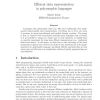Free Online Productivity Tools
i2Speak
i2Symbol
i2OCR
iTex2Img
iWeb2Print
iWeb2Shot
i2Type
iPdf2Split
iPdf2Merge
i2Bopomofo
i2Arabic
i2Style
i2Image
i2PDF
iLatex2Rtf
Sci2ools
PLILP
1990
Springer
1990
Springer
Efficient Data Representation in Polymorphic Languages
Languages with polymorphic types (e.g. ML) have traditionally been implemented using Lisp-like data representations--everything has to fit in one word, if necessary by being heap-allocated and handled through a pointer. The reason is that, in contrast with conventional statically-typed languages such as Pascal, it is not possible to assign one unique type to each expression at compile-time, an absolute requirement for using more efficient representations (e.g. unallocated multi-word values). In this paper, we show how to take advantage of the static polymorphic typing to mix correctly two styles of data representation in the implementation of a polymorphic language: specialized, efficient representations are used when types are fully known at compile-time; uniform, Lisp-like representations are used otherwise.
Automated Reasoning | Conventional Statically-typed Languages | Efficient Representations | PLILP 1990 | Polymorphic Types |
Related Content
| Added | 11 Aug 2010 |
| Updated | 11 Aug 2010 |
| Type | Conference |
| Year | 1990 |
| Where | PLILP |
| Authors | Xavier Leroy |
Comments (0)

